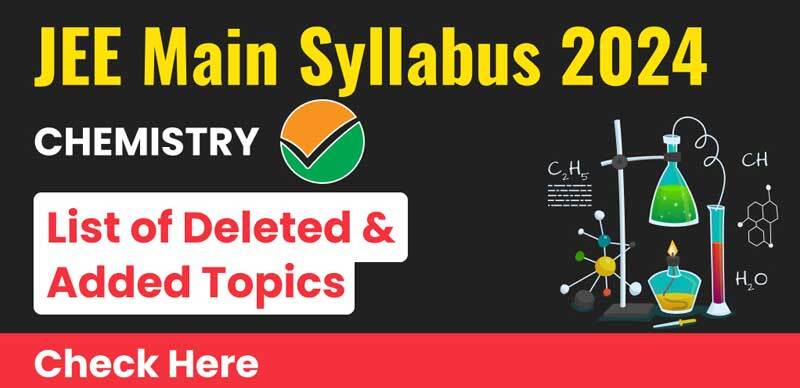JEE Main Chemistry Revised Syllabus 2024 Deleted & Added Topics

SHARING IS CARING
If our Website helped you a little, then kindly spread our voice using Social Networks. Spread our word to your readers, friends, teachers, students & all those close ones who deserve to know what you know now.
Removal of several topics and inclusion of new ones can be seen in the JEE Main Chemistry revised syllabus, available on SelfStudys. This updated syllabus, recently announced by the National Testing Agency offers both challenges and opportunities for aspiring engineers. It signifies a strong approach towards enhancing the quality and comprehensiveness of the examination, catering to your evolving needs and the demands of the contemporary scientific world.
One of the key aspects of the revised JEE Main Chemistry syllabus is its focus on conceptual clarity and application-based learning. It aims to strike a balance between the fundamental principles of chemistry and the latest developments in the field, providing you with an overall understanding of the subject while also equipping you with the required skills and knowledge to excel in the examination.
List Of Deleted Topics From JEE Main Chemistry Syllabus
Several topics have been deleted from the chemistry subject for JEE Mains. You can check out the table below in which we have prepared a list of the topics that have been removed from this subject. The JEE Main Chemistry reduced syllabus represents a strategic effort to refine the examination structure, optimize content coverage, and enhance the quality and relevance of engineering education in India.
Download PDF JEE Main Chemistry Deleted Syllabus 2024
| Unit | Detailed Topics |
| Some Basic Concepts in Chemistry | Physical quantities and their measurements in Chemistry, precision, and accuracy, significant figures. S.I.Units, dimensional analysis |
| Atomic Structure | Thomson and Rutherford atomic models and their limitations; |
| States of Matter | Classification of matter into solid, liquid, and gaseous states. Gaseous State: Measurable properties of gases: Gas laws - Boyle's law, Charle’s law. Graham's law of diffusion. Avogadro's law, Dalton's law of partial pressure; Concept of Absolute scale of temperature; Ideal gas equation; Kinetic theory of gases (only postulates); Concept of average, root mean square and most probable velocities; Real gases, deviation from Ideal behaviour, compressibility factor, and van der Waals equation. Liquid State: Properties of liquids - vapour pressure, viscosity and surface tension, and effect of temperature on them (qualitative treatment only). Solid State: Classification of solids: molecular, ionic, covalent and metallic solids, amorphous and crystalline solids (elementary idea); Bragg's Law and its applications: Unit cell and lattices, packing in solids (fcc, bcc and hcp lattices), voids, calculations involving unit cell parameters, an imperfection in solids; Electrical and magnetic properties. |
| Surface Chemistry | Adsorption- Physisorption and chemisorption and their characteristics, factors affecting adsorption of gases on solids - Freundlich and Langmuir adsorption isotherms, adsorption from solutions. Catalysis - Homogeneous and heterogeneous, activity and selectivity of solid catalysts, enzyme catalysis, and its mechanism. Colloidal state- distinction among true solutions, colloids, and suspensions, classification of colloids - lyophilic. lyophobic; multi-molecular. macromolecular and associated colloids (micelles), preparation and properties of colloids - Tyndall effect. Brownian movement, electrophoresis, dialysis, coagulation, and flocculation: Emulsions and their characteristics. |
| P- Block Elements | Groupwise study of the p - block elements Group -13: Preparation, properties, and uses of boron and aluminum; Structure, properties, and uses of borax, boric acid, diborane, boron trifluoride, aluminum chloride, and alums. Group -14: The tendency for catenation; Structure, properties, and uses of Allotropes and oxides of carbon, silicon tetrachloride, silicates, zeolites, and silicones. Group -15: Properties and uses of nitrogen and phosphorus; Allotrophic forms of phosphorus; Preparation, properties, structure, and uses of ammonia, nitric acid, phosphine, and phosphorus halides, (PCl3. PCl5); Structures of oxides and oxoacids of nitrogen and phosphorus. Group -16: Preparation, properties, structures, and uses of ozone: Allotropic forms of sulphur; Preparation, properties, structures, and uses of sulphuric acid (including its industrial preparation); Structures of oxoacids of sulphur. Group-17: Preparation, properties, and uses of hydrochloric acid; Trends in the acidic nature of hydrogen halides; Structures of Interhalogen compounds and oxides and oxoacids of halogens. Group-18: Occurrence and uses of noble gases; Structures of fluorides and oxides of xenon. |
| Unit 12: General Principles And Processes Of Isolation Of Metals | Modes of occurrence of elements in nature, minerals, ores; Steps involved in the extraction of metals - concentration, reduction (chemical and electrolytic methods), and refining with special reference to the extraction of Al. Cu, Zn, and Fe; Thermodynamic and electrochemical principles involved in the extraction of metals. |
| Hydrogen | Position of hydrogen in periodic table, isotopes, preparation, properties and uses of hydrogen; Physical and chemical properties of water and heavy water; Structure, preparation, reactions, and uses of hydrogen peroxide; Classification of hydrides - ionic, covalent, and interstitial; Hydrogen as a fuel. |
| s-Block Elements (Alkali And Alkaline Earth Metals)* | Group -1 and 2 Elements - General introduction, electronic configuration, and general trends in physical and chemical properties of elements, anomalous properties of the first element of each group, diagonal relationships. Preparation and properties of some important compounds - sodium carbonate and sodium hydroxide and sodium hydrogen carbonate; Industrial uses of lime, limestone. Plaster of Paris and cement: Biological significance of Na, K. Mg, and Ca |
| Environmental Chemistry | Environmental pollution - Atmospheric, water, and soil. Atmospheric pollution - Tropospheric and Stratospheric Tropospheric pollutants - Gaseous pollutants: Oxides of carbon, nitrogen, and sulphur, hydrocarbons; their sources, harmful effects, and prevention; Greenhouse effect and Global warming: Acid rain; Particulate pollutants: Smoke, dust, smog, fumes, mist; their sources, harmful effects, and prevention. Stratospheric pollution- Formation and breakdown of ozone, depletion of the ozone layer - its mechanism and effects. Water Pollution - Major pollutants such as. pathogens, organic wastes, and chemical pollutants; their harmful effects and prevention. Soil pollution - Major pollutants such as; Pesticides (insecticides. herbicides and fungicides), their harmful effects, and prevention. Strategies to control environmental pollution |
| Polymers | General introduction and classification of polymers, general methods of polymerization, - Addition and condensation, copolymerization. Natural and synthetic, rubber and vulcanization, some important polymers with emphasis on their monomers and uses – polythene, nylon, polyester, and bakelite |
| Chemistry In Everyday Life | Chemicals in Medicines - Analgesics, tranquilizers, antiseptics, disinfectants, antimicrobials, anti-fertility drugs, antibiotics, antacids. Anti-histamines -their meaning and common examples. Chemicals in food - Preservatives, artificial sweetening agents - common examples. Cleansing Agents - Soaps and detergents, cleansing action |
JEE Main Added Topics for Chemistry
Some new topics have been introduced in the JEE Main Chemistry revised syllabus by the exam conducting authorities. The expert team of SelfStudys has analyzed the official syllabus and then created the table below regarding the topics added to this subject. By learning about these topic additions, you can increase your knowledge and skills that are necessary for success in this competitive examination.
| Units/ Chapters | New Topics |
| Chemical Thermodynamics | Entropy |
| Biomolecules | Hormones (General introduction) |
Key Features Of JEE Main Chemistry Revised Syllabus
To enhance your preparation strategy, our subject-matter experts have discussed the features of the JEE Main Chemistry revised syllabus in detail below.
- The revised JEE Main Chemistry syllabus focuses on building a strong conceptual foundation in the subject, prioritizing understanding over memorization.
- The JEE Main Chemistry revised syllabus provides clear guidelines on the topics to be covered, the depth of understanding expected, and evaluation criteria, ensuring consistency and fairness in assessment.
- The syllabus aligns with the international standards and best practices in chemistry education, enhancing the competitiveness of the JEE Main examination globally.
Why Is It Important To Understand The Revised Syllabus Of JEE Main Chemistry Subject?
Below are some detailed points that will explain why understanding the JEE Main Chemistry revised syllabus is crucial for your success.
- Targeted Preparation: Knowing the exact topics from which the questions will be asked in the real exam allows you to focus your efforts properly. You will not be wasting any more time on irrelevant areas.
- Efficient Learning: By understanding the weightage of each section in the JEE Main Chemistry reduced syllabus, you can allocate study time strategically, maximizing your preparation.
- Application-Based Knowledge: The revised syllabus places more emphasis on applying theoretical knowledge to real-world problems. Practicing the application-based questions will sharpen your critical thinking skills and prepare you for the exam format.
- Confidence Booster: A clear understanding of the revised JEE Main Chemistry syllabus empowers you with a structure for success. This builds confidence and reduces exam anxiety, allowing you to perform at your best.
LATEST
JEE Main 2024 Revised Syllabus
JEE Main Mathematics Syllabus 2024 : List of Deleted & Added Topics
JEE Main Physics Syllabus 2024: List of Deleted & Added Topics
JEE Main Chemistry Syllabus 2024 : List of Deleted & Added Topics
Also READ
JEE Main 2024: Mathematics Quiz PDFs with Detailed Solutions
JEE Main 2024: Chemistry Quiz (1 to 10) PDFs with Detailed Solutions
JEE Main & Advanced Study Material







 Profile
Profile Signout
Signout












 Quiz
Quiz
 Get latest Exam Updates
Get latest Exam Updates 










